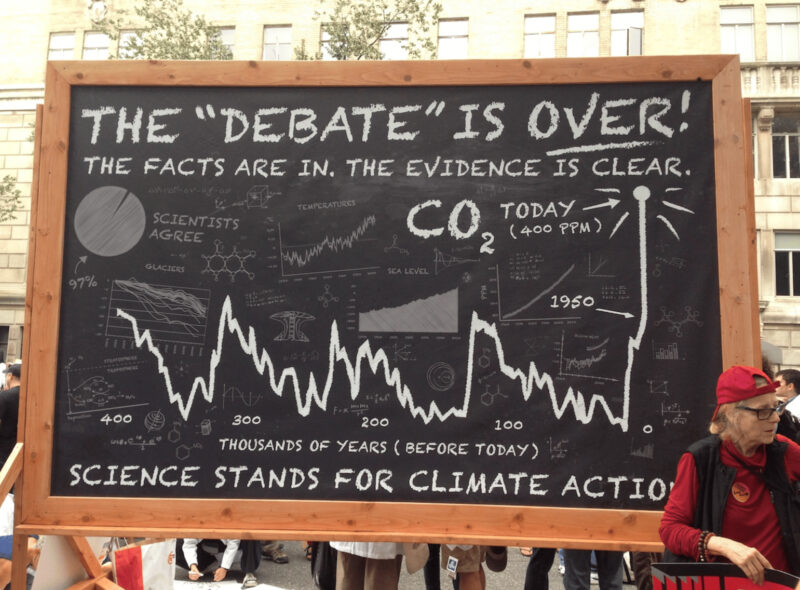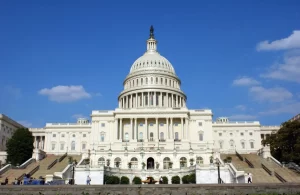
The world smiled when the assembled multitude at the COP28 climate conference in Dubai concluded its business by issuing a statement that called for “transitioning away from fossil fuels in energy systems, in a just, orderly and equitable manner.” People praised Sultan Al Jaber for having the courage to stand up to his Saudi friends, who had vehemently opposed the language of the final communique. While they might have been distressed, did anything actually change? One month later, there is little evidence COP28 had any measurable impact on the world of fossil fuels.
COP28 And Political Courage
Bill McKibben this week has an interesting post that is connected to this topic. It concerns the resignation of Chris Skidmore, a Conservative MP and former Secretary of Energy in the Tory government now led by Rishi Sunak. His decision was prompted by a decision by the prime minister to open up the North Sea to a new wave of oil and gas drilling. In his letter of resignation, Skidmore said,
Decisions taken at COP28 last month set in motion the global transition away from fossil fuels. As the exponential growth of renewable and clean power continues, as we seek to reduce our energy demand for fossil fuels through the adoption of better energy efficiency in buildings and industry, as the adoption of electricity replaces fossil fuels, there is no case to be made for increasing fossil fuel production at a time when investment should be made elsewhere, in the industries and businesses of the future, and not of the past.
As fossil fuels become more obsolete, expanding new oil and gas licences or opening new oil fields will only create stranded assets of the future, harming local and regional communities that should instead be supported to transition their skills and expertise to renewable and clean energy.
The bill that will be debated next week achieves nothing apart from to send a global signal that the UK is rowing ever further back from its climate commitments. We cannot expect other countries to phase out their fossil fuels when at the same time we continue to issue new licences or to open new oil fields. It is a tragedy that the UK has been allowed to lose its climate leadership, at a time when our businesses, industries, universities and civil society organisations are providing first class leadership and expertise to so many across the world, inspiring change for the better.
COP28 And Grand Posturing
Writing in the Washington Post, Shannon Osaka says, “The problem with every country’s promise to phase out fossil fuels is that nobody is really planning for a fossil fuel phaseout.” In other words, everyone is paying lip service to the idea expressed by the delegates in Dubai, while rushing full speed ahead to extract every molecule of coal, oil, or methane that still lies hidden beneath the Earth.
Exploring The Disconnect
Part of the reason for that disconnect, Lazarus said, is that many countries think they should keep producing fossil fuels while others stop. Norway, for example, touts the low carbon intensity of its oil and gas and argues that its exports are essential to Europe’s energy security. Saudi Arabia and other Persian Gulf states argue that they can produce oil and gas at lower cost than their competitors. The United States plans for its emissions to be “abated” through carbon capture and storage so they won’t pollute the atmosphere. Yeah, right. Like that’s gonna happen.
The result is nations rushing to gain the upper hand and market share before the world turns more solidly toward renewables. “There’s a rush to produce while the social license remains somewhat intact,” Lazarus said. “We can’t solve the climate crisis without solving the biggest cause of it, which is fossil fuels,” said Kelly Trout, the research co-director of Oil Change International. But many countries appear to believe they can do just that, Osaka warns.
Someone has to stop that cycle, and Skidmore is suggesting it should be the UK, Bill McKibben says. “Of course, it could also be the U.S. [Skidmore’s] bold resignation ups the pressure on the Department of Energy to at least say they will pause the granting of new export licenses for LNG as a growing list of activists and groups around the country are demanding. Simply by announcing that pause, he could show that America meant what it signed in Dubai.” As Skidmore said in the conclusion of his letter of resignation:
The future will judge harshly those that [promote more fossil fuel expansion]. At a time when we should be committing to more climate action, we simply do not have any more time to waste promoting the future production of fossil fuels that is the ultimate cause of the environmental crisis that we are facing.
The Takeaway
We have been down this road so many times. A group of muckety mucks holds a conference like COP28 somewhere in the world and trumpets its intention to finally do something about how fossil fuels that are leading to an overheating planet. And every year the world keeps on adding more poisons to the atmosphere. McKibben calls the Skidmore resignation an act of great political courage.
The Biden administration could also show great political courage by nixing the plan to construct more LNG terminals in the Gulf of Mexico. But it won’t, at least not now, because it would be political suicide. Maybe if Biden (or some other progressive) wins the next presidential election, that would be the right time to call a halt to those terminals. Biden said yesterday that this election is all about preserving democracy but it is more than that.
It could be a turning point in which the US takes a stand against the proliferation of fossil fuels that will stand as an example to other nations or it could mark a time when humanity finally turns its back on trying to control global heating. It is no exaggeration to say this could be the most important election in the history of the United States and the world. Choose wisely.
Have a tip for CleanTechnica? Want to advertise? Want to suggest a guest for our CleanTech Talk podcast? Contact us here.
Our Latest EVObsession Video
[embedded content]I don't like paywalls. You don't like paywalls. Who likes paywalls? Here at CleanTechnica, we implemented a limited paywall for a while, but it always felt wrong — and it was always tough to decide what we should put behind there. In theory, your most exclusive and best content goes behind a paywall. But then fewer people read it!! So, we've decided to completely nix paywalls here at CleanTechnica. But...
Thank you!
Advertisement
CleanTechnica uses affiliate links. See our policy here.
- SEO Powered Content & PR Distribution. Get Amplified Today.
- PlatoData.Network Vertical Generative Ai. Empower Yourself. Access Here.
- PlatoAiStream. Web3 Intelligence. Knowledge Amplified. Access Here.
- PlatoESG. Carbon, CleanTech, Energy, Environment, Solar, Waste Management. Access Here.
- PlatoHealth. Biotech and Clinical Trials Intelligence. Access Here.
- Source: https://cleantechnica.com/2024/01/06/one-month-after-cop-28-has-anything-changed/
- :has
- :is
- :not
- :where
- $UP
- 1
- 15%
- 20
- 2050
- 28
- 36
- 46
- 54
- 9
- a
- About
- above
- Achieves
- across
- Act
- Action
- activists
- actually
- adding
- administration
- Adoption
- Advertise
- Affiliate
- After
- against
- Agreement
- ahead
- AL
- align
- All
- allowed
- almost
- also
- always
- america
- an
- analyzed
- and
- Announcing
- any
- anything
- apart
- appear
- Arab
- Arab Emirates
- ARE
- argue
- Argues
- around
- AS
- assembled
- Assets
- Associate
- At
- Atmosphere
- authors
- average
- away
- back
- BE
- because
- become
- becoming
- been
- before
- behind
- believe
- BEST
- Better
- between
- Beyond
- biden
- Biden Administration
- Biggest
- Bill
- Bit
- bold
- business
- businesses
- but
- by
- call
- called
- Calls
- CAN
- cannot
- capture
- carbon
- carbon capture
- case
- Cause
- change
- changed
- chip
- Choose
- Chris
- civil
- class
- clean
- clean energy
- cleantech
- Cleantech Talk
- Climate
- climate action
- climate crisis
- Coal
- commitments
- committing
- Communique
- Communities
- Companies
- company
- competitors
- complete
- completely
- Concerns
- concluded
- conclusion
- Conference
- conferences
- connected
- conservative
- consistent
- construct
- content
- continue
- continues
- contrary
- control
- cop28
- Cost
- could
- countries
- country
- country’s
- courage
- course
- create
- crisis
- Cut
- cycle
- darker
- decide
- decided
- decision
- delegates
- Demand
- demanding
- Democracy
- Department
- Department of Energy
- Development
- DID
- distressed
- do
- don
- down
- drilling
- Dubai
- earth
- effect
- efficiency
- Election
- electricity
- elsewhere
- embedded
- emirates
- Emissions
- energy
- energy efficiency
- enough
- Environment
- environmental
- equitable
- essential
- established
- estimates
- Europes
- Even
- EVER
- Every
- everyone
- evidence
- example
- Exclusive
- expanding
- expansion
- expect
- expertise
- exponential
- Exponential Growth
- export
- exports
- expressed
- extract
- facing
- far
- felt
- few
- fewer
- Fields
- final
- Finally
- First
- For
- Former
- fossil
- Fossil fuel
- fossil fuels
- friends
- from
- Fuel
- fuels
- full
- further
- future
- Gain
- gap
- GAS
- Global
- Goals
- Goes
- Government
- Governments
- grand
- granting
- great
- Group
- Group’s
- Growing
- Growth
- Guest
- gulf
- had
- hand
- happen
- harming
- Have
- having
- he
- help
- here
- Hidden
- his
- history
- holding
- holds
- How
- HTTPS
- Humanity
- Humans
- idea
- if
- Impact
- implemented
- important
- in
- In other
- Including
- increasing
- industries
- industry
- inspiring
- instead
- Institute
- Intention
- interesting
- International
- into
- investment
- issue
- issuing
- IT
- ITS
- itself
- jpg
- judge
- just
- Keep
- language
- large
- larger
- Last
- later
- latest
- Lazarus
- Leadership
- leading
- least
- Led
- letter
- levels
- licences
- License
- licenses
- lies
- like
- likes
- Limited
- links
- List
- little
- lng
- local
- lose
- Low
- lower
- made
- make
- manner
- many
- mark
- Market
- market share
- maybe
- meant
- Media
- Meet
- methane
- Mexico
- Michael
- might
- minister
- mistake
- molecule
- Month
- more
- most
- motion
- much
- multitude
- Nations
- Need
- needed
- New
- news
- next
- next week
- no
- North
- North Sea
- Norway
- nothing
- now
- obsolete
- of
- Oil
- Oil and Gas
- on
- ONE
- only
- open
- opening
- opposed
- or
- Organisations
- Other
- Others
- our
- out
- over
- own
- paris
- part
- past
- pause
- paying
- People
- phase
- plan
- planet
- planning
- plans
- plato
- Plato Data Intelligence
- PlatoData
- player
- podcast
- Point
- policy
- political
- position
- Post
- power
- Praised
- preserving
- presidential
- presidential election
- pressure
- Prime
- prime minister
- Problem
- produce
- producer
- producing
- Production
- progressive
- projected
- promise
- promote
- promoting
- providing
- publish
- put
- Read
- Reader
- real
- really
- reason
- reduce
- regional
- remains
- Renewable
- Renewables
- report
- required
- research
- Resignation
- result
- right
- RISHI SUNAK
- road
- rush
- Russia
- s
- Said
- same
- Saudi
- Saudi Arabia
- say
- says
- Scientist
- SEA
- secretary
- security
- see
- Seek
- sees
- send
- senior
- service
- set
- Share
- should
- show
- Shows
- Signal
- signed
- simply
- skills
- So
- so Far
- Social
- Society
- SOLVE
- Solving
- some
- somewhat
- somewhere
- speed
- stand
- States
- Still
- Stop
- storage
- Stories
- suggest
- Suicide
- sultan
- support
- Supported
- survive
- sustainable
- Sustainable Development
- Systems
- T
- taken
- takes
- Talk
- Target
- team
- terminals
- text
- than
- that
- The
- The Future
- the UK
- the world
- their
- then
- theory
- There.
- they
- think
- this
- this week
- those
- Through
- time
- times
- tip
- to
- topic
- tough
- toward
- transition
- truth
- trying
- Turning
- turning point
- turns
- Twice
- u.s.
- Uk
- ultimate
- unique
- United
- United Arab Emirates
- United States
- Universities
- Updates
- UPS
- us
- uses
- Ve
- Video
- want
- Warns
- was
- Waste
- Wave
- Way..
- we
- week
- WELL
- What
- What is
- when
- which
- while
- WHO
- why
- will
- Wins
- wisely
- with
- without
- words
- world
- world’s
- would
- write
- Wrong
- year
- yesterday
- you
- Your
- youtube
- zephyrnet




